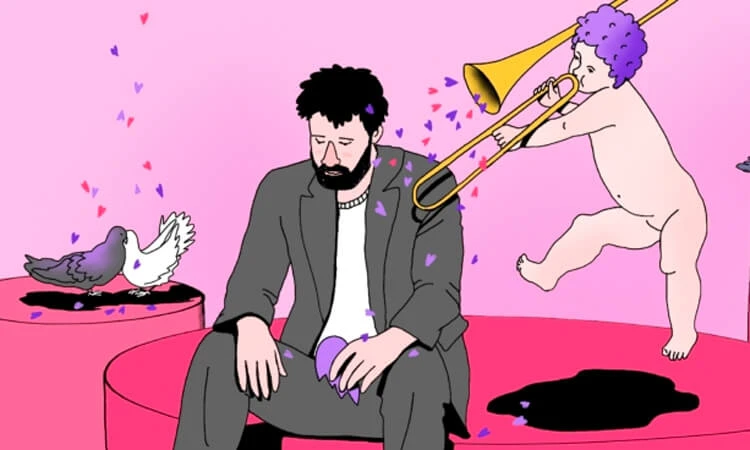- Video: If You Are Dealing With HEARTBREAK, Watch This!
- 1. Shock and denial
- 2. Finding the reasons for the breakup and ways to fix it
- 3. Bargaining and negotiations
- 4. Relapse
- 5. Anger
- 6. Depression
- 7. Acceptance
- 8. Moving Forward
- Video: Therapist Shares How to Recover from a Breakup
- Rate the author (1)
- Comments (1)
How to get through the 8 stages of a breakup with minimal losses? Breakups are difficult experiences, and the sooner you start to perceive these experiences as stages on the way to a new life, the easier it will be for you to recover. Each breakup takes time to comprehend, and its duration is individual. But there are certain stages that almost everyone goes through.
The number of stages can vary: some psychologists say there are five, others - that there are more. We analyzed various opinions and identified eight main stages that you will have to go through during a breakup. Understanding these stages will help you better navigate your feelings, and also give you confidence that you are not alone - many people go through similar experiences.
So, how to cope with a breakup with a loved one - further in our article.
Video: If You Are Dealing With HEARTBREAK, Watch This!

1. Shock and denial
At the first stage, many are unable to accept what is happening. Some people think that nothing terrible has happened, because they have already experienced difficult moments, and everything has always been resolved. Others hope that as long as they do not take the situation seriously, the relationship can still be saved. A third may choose to ignore what is happening, completely immersing themselves in urgent matters to distract themselves.
At this stage, painful emotions are usually absent. Denial serves as a defense that allows the psyche to cope with intense experiences.
Scarlett O'Hara's words could describe this period: "I'll think about it tomorrow." A person may hope that thoughts of a breakup will not be necessary at all, and all issues will be resolved on their own. However, the shock eventually passes, and it becomes obvious that such hopes were just an illusion.
What to do: You should not lock yourself in your feelings. Allow yourself to comprehend what is happening. Discuss your thoughts and feelings with close friends. This can help you cope more easily when you share your experiences.
If you want to talk to your ex, don't pretend that everything is the same. Openly discuss the current situation and perhaps decide whether to continue the relationship or break up for good.
2. Finding the reasons for the breakup and ways to fix it
A breakup is always painful, and many people feel deep emotional grief after such an event. Often, the thought arises that the decision to break up was rash. Many are convinced that their couple still has potential, and the problems arose only because of the wrong steps taken at some stage. Therefore, they begin to think: first of all, it is necessary to find out what exactly caused the breakup, and then look for ways to restore the relationship.
At this stage, many begin to play out different versions of events in their heads, trying to replay them. Thoughts constantly arise: "What if ..." It seems that if other words had been spoken at that moment, or if attention had been paid to details that then seemed insignificant, perhaps all this could have been avoided.
Emotions become an interconnected mixture. On the one hand, there is relief from the fact that all quarrels and conflicts, if they took place, are already behind us. On the other hand, anger at the ex-partner and sadness from his absence are maturing. Helplessness and self-doubt add to this range of feelings and doubts - whether it was really necessary to break up. And again comes despair in search of an answer to the question, could everything have been different.
What to do: First of all, it is important to realize that you do not have a time machine and the opportunity to replay events is unattainable. Secondly, allow yourself to understand that neither you nor your partner could have acted differently in those circumstances. And finally, decide that you will return to the analysis of the situation later, when the emotions have subsided a little and the pain has become less acute.
Remember to listen to your body and take care of yourself. Perhaps you should take a walk in the fresh air or turn on light music and dance a little - such simple actions can significantly improve your condition.
3. Bargaining and negotiations
When the breakup is still fresh in the memory, many begin to think about how to live on without their ex-partner. At this point, the intention may arise: “Even though nothing can be changed, I depend on the future! I need to try to fix what is broken.”
There may be a desire to become more understanding, sensitive and attentive, hoping that the ex-partner will notice these changes, and your relationship will return to its previous path.
What to do: At this stage, some may have the illusion that they are in complete control of the situation. It is understandable to want to bring back the best moments, but it is important to remember that the breakup was caused by both partners, not just yours. Trying to become better and fix all the problems, you take full responsibility for the relationship. This can lead to new failures.
If your ex-partner has clearly stated that he does not want to continue the relationship, the chances of recovery will be extremely low. However, if he is also experiencing the pain of the breakup, just like you, it is worth discussing what happened again. Perhaps you will both be ready to try to restore what was broken.
Experiencing loss is far from straightforward. Although the stages have their meaning, in reality, everything is much more complicated. A person can start with denial, and then immediately move on to attempts to bargain. Or, conversely, he can waver between bargaining and sadness, returning to denial. Each person goes through these stages differently: some stay longer at one of them, while others move on quickly. This happens because the process of living through loss is serious and difficult work that requires us to understand and assimilate the experience. Each step requires effort, and this interaction with our own feelings becomes an important part of our internal growth.
4. Relapse
You and your partner may decide to start all over again. The future of this step is impossible to predict, because each of you is on your own path. Some may actually reconnect after a conflict, and the breakup will turn into reconciliation.
However, this stage of separation is called relapse for a reason. Many people start communicating again only because the pain of the breakup seems unbearable, and only find temporary relief. The problems between you remain deeper than they seem, and soon after the initial breakup, a new one arises - already the second.
What to do: If you want to try again, that's your decision. But be prepared for the fact that you may soon realize that the breakup was not accidental, and your relationship has no future. Prepare yourself - at least mentally - for any outcome: both a happy ending and a final breakup.
5. Anger
When it is no longer possible to fix the situation, hopes are replaced by a strong feeling of resentment and anger. In the previous stages, it seemed that the problem could only be related to your behavior. But now anger can be directed at your ex-partner.
This anger can manifest itself not only in words. You may send hurtful messages to your ex, delete photos of them together, or remove all mentions of them from your social media profiles. This is often the stage when arguments and heated showdowns arise.
What to do: Keep in mind that anger is a natural reaction to any loss, and your feelings are completely normal. You may even be happy, because rage indicates that your psyche is functioning properly.
Use the energy caused by anger for something productive that is not related to the past relationship. Maybe start doing more sports or moving.
There is a famous sad joke about Dr. Kübler-Ross, one of those who proposed the grief model. She suffered from a long-term and chronic illness, spent the last ten years of her life in a wheelchair, almost constantly in front of the TV. In her last days, she admitted that she did not feel any resignation - the very one that, according to her own model, should appear at stage five. Instead, she continued to experience anger.
This story vividly illustrates how unique each process of experiencing loss is. Each case is individual, and there is no universal recipe that would suit everyone.
Relief will come when you realize that anger is useless, and in fact, your indignation is directed not at the person, but at the circumstances that brought so much pain.
6. Depression
At this stage, you fully realize that what was lost can no longer be returned. Understanding the inevitability of loss is often accompanied by a feeling of helplessness, deep melancholy and sadness. It may seem that bright days will never return.
During depression, dark thoughts begin to spin in your head: “I will never meet anyone who would be as dear to me”, “No one will love me again”, “Now my destiny is loneliness”, “Happiness has left me forever”. These ideas are familiar to many who are going through a similar stage.
You may notice that you are spending more time alone. Even hanging out with friends can quickly become exhausting.
What to do: Allow yourself to feel grief. If you feel like crying, let it flow. Sadness and depression are natural reactions to loss.
If you have sad thoughts, try changing their wording. For example, if you find yourself thinking, “It’s so sad to be alone — the evenings now seem like an eternity,” you can tell yourself, “Yes, it’s sad to sit alone and not know what to do. But that means I can find something enjoyable for myself. I have a lot of opportunities — time to think about self-development or hobbies, and no one will judge my choice — "This is great!"
At this stage, it is especially important to take care of your physical and mental well-being. Make sure that your food is nutritious and tasty, that you get enough sleep and rest. Surround yourself with places where you feel comfortable, and try to please yourself - you deserve it.
7. Acceptance
The emotions inherent in this stage often arose in the previous stages. You may have realized that the separation is already a fact, but life goes on, and there is much good ahead. Whereas before, such moments of understanding were short-lived, now they become permanent.
You feel less and less excruciating longing for your ex-partner. You realize that your world has changed. Yes, it may not bring you joy, but you are ready to look for ways to live in new conditions.
What to do: Thank yourself for your resilience - you overcame a difficult test. You can also mentally thank your ex-partner - your relationship gave you important experience that will certainly be useful in the future.
Remember that loss is often followed by a period of growth and development. Research shows that some time after a breakup, many people notice that they began to feel stronger, more independent and emotionally stable.
8. Moving Forward
At this stage, you will begin to feel that you have been able to cope with the loss and are ready to move on. There is an understanding that life can be full and without your former partner. You have probably begun to accept invitations from friends more often and do not miss the opportunity to meet new people who can become something more in the future. It's time to hope for new happiness.
What to do: This is a great time to get to know yourself better. You may develop new interests and hobbies. If you want to be more social, don't hesitate to keep in touch with old friends and expand your horizons by meeting new people. Be prepared for the fact that over time, you may develop new romantic relationships.
Everyone goes through the breakup process differently. For some, it may take longer, and for others, less. And you don't have to wait a year to recover and try to start a new relationship. Your uniqueness also determines how you cope with experiences. Your path to healing and understanding loss will be as individual as you are.
And one more important thought: remember that even the most difficult period in life will sooner or later pass. Every stage, no matter how difficult, will definitely end, giving room for a new beginning.
Video: Therapist Shares How to Recover from a Breakup



















Comments (1)
Allow yourself to experience all the emotions that come with a breakup: pain, anger, sadness, and even relief. Acknowledging your feelings is an important step toward healing.
2. Talk About Your Feelings
Feel free to share your experiences with loved ones, friends, or a therapist. Communication can help you process your emotions and get support. Sometimes, just talking can help you release emotional baggage.
3. Remove Reminders of Your Partner
Try to remove or hide things that remind you of your ex. This can include photos, gifts, or even shared items. This will help you create space for healing.
4. Create a New Routine
Change your habits. Take up new hobbies, sign up for a class, or find a new passion. This will help you take your mind off things and focus on yourself.
5. Take care of your health
Take care of your physical well-being by eating right, exercising, and getting enough sleep. Physical activity can help improve your mood and reduce stress.
6. Set time boundaries
If you need to communicate with your ex (for example, about matters related to shared activities), try to set time boundaries. Limit communication to give yourself time to heal.
7. Write down your thoughts
Keeping a journal can help you understand your feelings and experiences. Write down everything that comes to mind: thoughts, emotions, plans for the future.
8. Give yourself time
Don’t expect your feelings to change right away. The healing process takes time, and that’s okay. Allow yourself to move forward slowly and be patient with yourself.
9. Set goals
Focus on future goals and dreams. This can be both professional and personal development. Working on new goals will open up new horizons and ideas.
10. Consider professional help
If you feel like you’re struggling to cope with your emotions or lows, it may be worth reaching out to a therapist or counselor. Professionals can offer support and strategies to help you get through this difficult time.
Everyone experiences a breakup differently, and the best approach to healing is different for everyone. The key is to give yourself the time and space to heal, and remember that after every storm comes a brighter day. You can get through this and move forward to new opportunities!